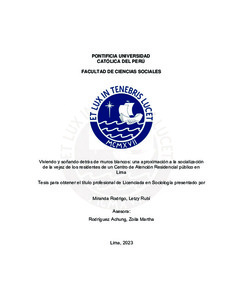| dc.contributor.advisor | Rodríguez Achung, Zoila Martha | |
| dc.contributor.author | Miranda Rodrigo, Letzy Rubí | |
| dc.date.accessioned | 2023-06-20T22:12:17Z | |
| dc.date.available | 2023-06-20T22:12:17Z | |
| dc.date.created | 2023 | |
| dc.date.issued | 2023-06-20 | |
| dc.identifier.uri | http://hdl.handle.net/20.500.12404/25242 | |
| dc.description.abstract | La presente investigación es un acercamiento a la vida cotidiana de las/los residentes de
un CAR Mixto de Lima y tiene por objetivo comprender la forma en la que aprenden a ser
personas envejecidas en un espacio institucional. Planteamos que, en su proceso de
adaptación al CAR, a la par de una serie de rupturas y despojos de su antiguo yo
socializado (Goffman 1961), como en todo proceso de socialización, confluyen elementos
de aprendizaje y asunción de roles y prácticas ligadas a ser adultos mayores
institucionalizados. Tomamos a Giddens (2014) y a Macionis y Plummer (2011) para
comprender el proceso de socialización como un proceso permanente de formación de
la identidad personal y asunción de roles y prácticas. En cuanto se trata de personas con
trayectorias consolidadas y biografías casi completas, nuestra labor es doble: por un lado,
localizar a los agentes socializadores que legaron ideas, imágenes y expectativas sobre
la vejez y, por el otro, comprender el proceso de socialización de cada residente a partir
de sus rutinas y su relación con los otros. Nuestro principal hallazgo es que nuestros
entrevistados no se asumen como personas adultas mayores ni ancianas ni viejas, sino
que desplazan la vejez a otros cuerpos. Asimismo, sus procesos de adaptación a la
cultura del CAR son reflexivos y particulares y no han incidido en la asunción de la propia
vejez. Por el contrario, los entrevistados reafirman su identidad y construyen sus rutinas
en oposición a una otredad anciana, enferma e inactiva. | es_ES |
| dc.description.abstract | This research is an approach to the daily life of the residents of one CAR in Lima and aims
to understand the way in which they learn to be elderly people in an institutional space. In
their process of adaptation to the CAR, as well as going through a series of ruptures and
dispossessions of their former socialized self (Goffman 1961), we propose that, as in any
socialization process, elements of learning and assumption of roles and practices linked
to being institutionalized older adults converge. We take Giddens (2014) and Macionis
and Plummer (2011) to understand the socialization process as a permanent process of
personal identity formation and assumption of roles and practices. As we are dealing with
people with consolidated trajectories and almost complete biographies, our task is twofold:
on the one hand, to locate the socializing agents who bequeathed ideas, images and
expectations about old age and, on the other hand, to understand the socialization
process of each resident from their routines and relationship with others. Our main finding
is that our interviewees do not assume themselves to be older adults, neither old nor
elderly, but rather they displace old age to other bodies. Likewise, their processes of
adaptation to the CAR culture are reflexive and particular and have not had an impact on
the assumption of their own old age. On the contrary, the interviewees reaffirm their
identity and construct their routines in opposition to an old, sick, and inactive otherness. | es_ES |
| dc.language.iso | spa | es_ES |
| dc.publisher | Pontificia Universidad Católica del Perú | es_ES |
| dc.rights | info:eu-repo/semantics/openAccess | es_ES |
| dc.rights.uri | http://creativecommons.org/licenses/by-sa/2.5/pe/ | * |
| dc.subject | Envejecimiento--Perú | es_ES |
| dc.subject | Asilos--Perú--Lima | es_ES |
| dc.subject | Vejez--Perú--Lima | es_ES |
| dc.subject | Adulto mayor--Socialización--Perú | es_ES |
| dc.title | Viviendo y soñando detrás de muros blancos: una aproximación a la socialización de la vejez de los residentes de un Centro de Atención Residencial público en Lima | es_ES |
| dc.type | info:eu-repo/semantics/bachelorThesis | es_ES |
| thesis.degree.name | Licenciado en Sociología | es_ES |
| thesis.degree.level | Título Profesional | es_ES |
| thesis.degree.grantor | Pontificia Universidad Catolica del Peru. Facultad de Ciencias Sociales | es_ES |
| thesis.degree.discipline | Sociología | es_ES |
| renati.advisor.dni | 06176995 | |
| renati.advisor.orcid | https://orcid.org/0000-0002-4617-2778 | es_ES |
| renati.author.dni | 70092719 | |
| renati.discipline | 314086 | es_ES |
| renati.juror | Castro Carpio, Augusto José Antonio Lazaro | es_ES |
| renati.juror | Rosales Lassús, José Luis | es_ES |
| renati.juror | Rodríguez Achung, Zoila Martha | es_ES |
| renati.level | https://purl.org/pe-repo/renati/level#tituloProfesional | es_ES |
| renati.type | https://purl.org/pe-repo/renati/type#tesis | es_ES |
| dc.publisher.country | PE | es_ES |
| dc.subject.ocde | https://purl.org/pe-repo/ocde/ford#5.04.01 | es_ES |







